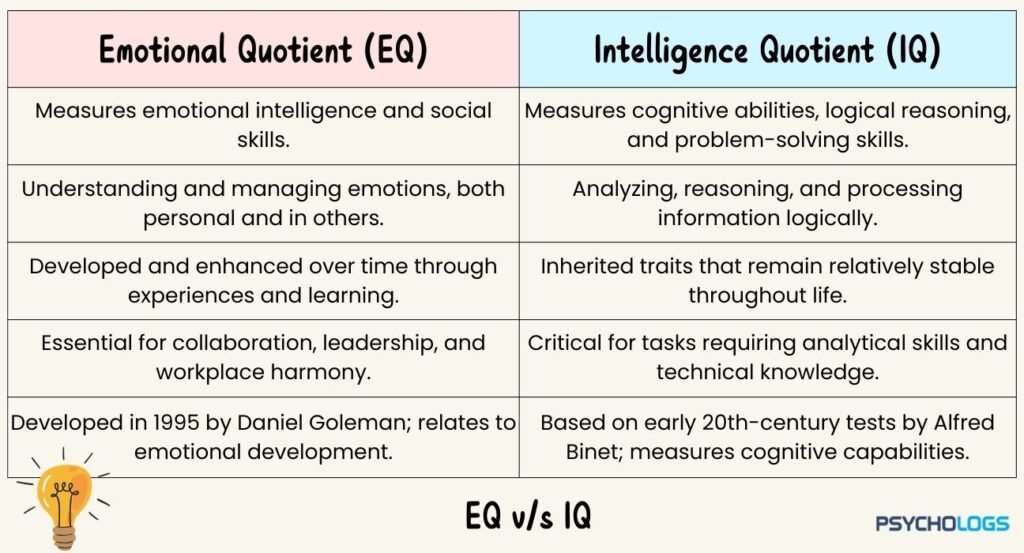Two key concepts that often come up when trying to understand human behaviour are Emotional Intelligence/Quotient (EQ) and Intelligence Quotient (IQ), which are seen as important for explaining what shapes our behaviour. In essence, both terms are critical for considering every dimension of human capability and differ vastly in their definitions, applications, and implications when translated into personal and professional settings. This essay explores the differences between EQ and IQ, utilizing examples and narratives to identify their diverse roles in our lives.
Measuring IQ
IQ, or Intelligence Quotient, describes cognitive ability and a potential for intelligence. There have been so many years where IQ tests have been used to measure this cognitive function in many areas of intelligence, such as logical reasoning, mathematical, vocabulary, and spatial abilities. These tests provide a score that is compared to the general population, helping to identify specific areas of intellectual ability. IQ was first developed in the early 20th century by French psychologist Alfred Binet. He developed the first intelligence test to identify students who required special educational support. Since then, IQ tests have evolved and become more complex, with applications in educational, clinical, and corporate settings.
Read More: Theories of Intelligence in Psychology
Example of IQ in Action
Maria was a standout student in math and science from an early age. After taking an IQ test, she scored in the 95th percentile, indicating very high cognitive abilities. This impressive score opened doors for scholarships and advanced placement in school, allowing her to pursue her passion for engineering. Maria’s high IQ proved to be a significant advantage, demonstrating how cognitive intelligence can shape academic and professional success.
What is EQ?
Emotional Intelligence, abbreviated also as EQ, is the ability to recognize, understand, and to an extent, manage our emotions, as well as identify, understand, and influence the emotions of others. The term was coined in the mid-1990s by psychologist Daniel Goleman, who reasoned that EQ is as important as IQ in deciding success in life and at work.
EQ integrates some of these dimensions: self-awareness, self-regulation, motivation, empathy, and social skills. More specifically, an individual with high EQ copes with the complex social environment, masters stress management, and forms healthy relationships. Contrary to IQ which is relatively stable throughout one’s life, EQ occurs due to different factors in a person, usually developing over time through experience and practice.
Read More: How Emotional Intelligence Plays an important role in Your Life
A Case of Applying EQ in Real Life
The case of James, a team leader of a tech company: In a highly challenging project, the team’s morale started breaking down since they were always under pressure with very short timelines. His emotional intelligence for James made him realize how frustrated his team members were. He brought together the team and organized a team-building retreat where everybody voiced out their concerns and brainstormed solutions to the technical problems of the project. When James ensured his team was emotionally taken care of, the morale improved, and so did the productivity. The EQ allowed him to relate with his team, making the working environment positive.
Read More: The Role of Emotional Intelligence in Leadership, According to Psychology

EQ vs. IQ: Playing Different Roles in Existence
While both EQ and IQ contribute to success, each does so in their respective ways. IQ has the role of being a marker for winning in school and professional activities at places where analytical skills and problem-solving abilities are very important. The high IQ type finds precious niches in technical professions, research, and academic institutions where logical reasoning and analytical thinking are of the essence.
On the other hand, EQ has a great role in interpersonal relations, leadership, and emotional well-being. Those with high levels of EQ are effective at teamwork and conflict resolution as well as networking. For instance, when it comes to leadership, having emotional intelligence may make the difference between a good leader versus a lousy one. Therefore, with emotional intelligence, a leader will distinguish a person who inspires, motivates, and gives a sense of belonging to members, and therefore results in higher engagement and productivity.
Interplay Between EQ and IQ
It would come as no surprise then that even though IQ and EQ have given forms of expression to these two extremes, sometimes they do interact meaningfully. For instance, a higher IQ helps in taking in complex concepts, while a higher EQ helps in presenting those ideas effectively. Even without a very high IQ, individuals with strong emotional intelligence (EQ) can excel by becoming effective team players. They use their emotional skills to foster positive working relationships, which can lead to success in collaborative environments.
Example of Interplay
Sarah is an individual with a high IQ. She could code and design algorithms like no other but lacks qualities in communication. Tom is an individual with high EQ. He could keep the flow and smooth out conflict in discussions. The interaction is significant because Sarah’s technical skills will be enhanced by Tom’s ability to foster collaboration, leading to the successful completion of the project. This shows how both types of intelligence can work well, specifically in group work.

Significance to Personal Growth
In personal development, balance IQ with EQ. Right, a balanced individual will result from this paradigm. One might pursue academic endeavours, but emotional intelligence will still make one’s life much more meaningful. People with high EQ always seem to enjoy a higher quality of life that is coupled with good relationships, efficient stress management, and better psychological well-being.
Alex is one such young professional who, earlier, used to focus solely on the technical aspect of the corporate ladder-climbing process. It was only later that he realized that not being emotionally sensitive with his subordinates was leading to failure in the workplace. Alex, after attending those workshops on emotional intelligence, understood himself and showed more empathy towards people than ever before; subsequently, he became sensitive to his colleague’s feelings and then transformed the relationship dynamics in the workplace. His career flourished at this point as he transitioned into a management role, really showing how EQ can be decisive in personal and professional development.
Conclusion
Though IQ and EQ are two dimensions of human intelligence, they work differently and find expression in somewhat different ways. The former is largely an index of the cognitive abilities and intellectual potential that influence both academic and career opportunities. The latter constitutes emotional awareness, and interpersonal skills, and strongly dictates relationships and leadership skills. Both intelligences help navigate the complex world today.
It can lead to a richer, more fulfilling life, owing to a proper balance between the cognitive and the emotional skills, as when the value of each is recognized. The interaction between IQ and EQ shows us that while intellect can open doors, emotional intelligence shapes how we navigate relationships, and experiences, and achieve success in both personal and professional aspects of life. It stresses that developing the two kinds of intelligence would mean a more holistic approach in all areas of education, career planning, and personal growth, making sure that people are not only knowledgeable but also in touch and emotionally connected with their surroundings.
FAQs
Q1: What is the main difference between EQ and IQ?
A1: IQ refers to cognitive abilities and intellectual potential-including skills such as reasoning, problem-solving, and analytical thinking. EQ concentrates on emotional awareness, empathy, and interpersonal skills, that is, ability to manage emotions and relationships.
Q2: Can EQ be developed over time?
A2. Yes. Emotional intelligence can be learned through practice and experience. Workshops, self-reflection, and social intercourse help enlarge the scope of emotional awareness and EQ enhancement.
Q3: Is one more important than the other for success?
A3. Both EQ and IQ are alike to the same degree; however, their importance varies with context. High IQ may be more necessary for technical fields, while in leadership, teamwork, and personal relationships, it is high EQ.
Q4: How is EQ measured?
A4: One can measure the EQ of a person through various tools, such as the Emotional Quotient Inventory or EQ-i or the Mayer-Salovey-Caruso Emotional Intelligence Test, also known as MSCEIT. Both these tests score different qualities of emotional intelligence.
Q5: Is it possible that someone can possess a high IQ but a low EQ?
A5: Yes, in some cases, individuals may possess the ability to possess intelligence on accomplishing cognitive tasks, but they do not possess the emotional capabilities. This amalgamation in some cases creates uphill social interactional problems in interpersonal relationships.
Q6: Any practical strategies to develop EQ?
A6: To develop EQ, an individual should be an active listener and ask for feedback about one’s own performance from others, and mindfulness needs to be consciously practiced. More importantly, the ability to put oneself in another’s shoes is empathy.
Q7: How do the emotional competencies affect leadership?
A7: High EQ leaders are in a better position to inspire and motivate their teams; manage conflicts constructively; and create a positive, constructive work environment. These tend to increase employee engagement and lead to better team performance on the whole.
Q8: Are there certain sectors where EQ is valued more?
A8: Yes, in various sectors focusing on collaboration, communication, and customer service, and especially with a large focus on healthcare, education, and management, EQ is more highly valued.
References +
- Cotruş, A., Stanciu, C., & Bulborea, A. A. (2012). EQ vs. IQ Which is Most Important in the Success or Failure of a Student? Procedia – Social and Behavioral Sciences, 46, 5211–5213. https://doi.org/10.1016/j.sbspro.2012.06.411
- O’Connor, P. J., Hill, A., Kaya, M., & Martin, B. (2019). The Measurement of Emotional Intelligence: A critical review of the literature and recommendations for researchers and practitioners. Frontiers in Psychology, 10. https://doi.org/10.3389/fpsyg.2019.01116
- Checa, P., & Fernández-Berrocal, P. (2015). The role of intelligence quotient and emotional intelligence in cognitive control processes. Frontiers in Psychology, 6. https://doi.org/10.3389/fpsyg.2015.01853













Leave feedback about this